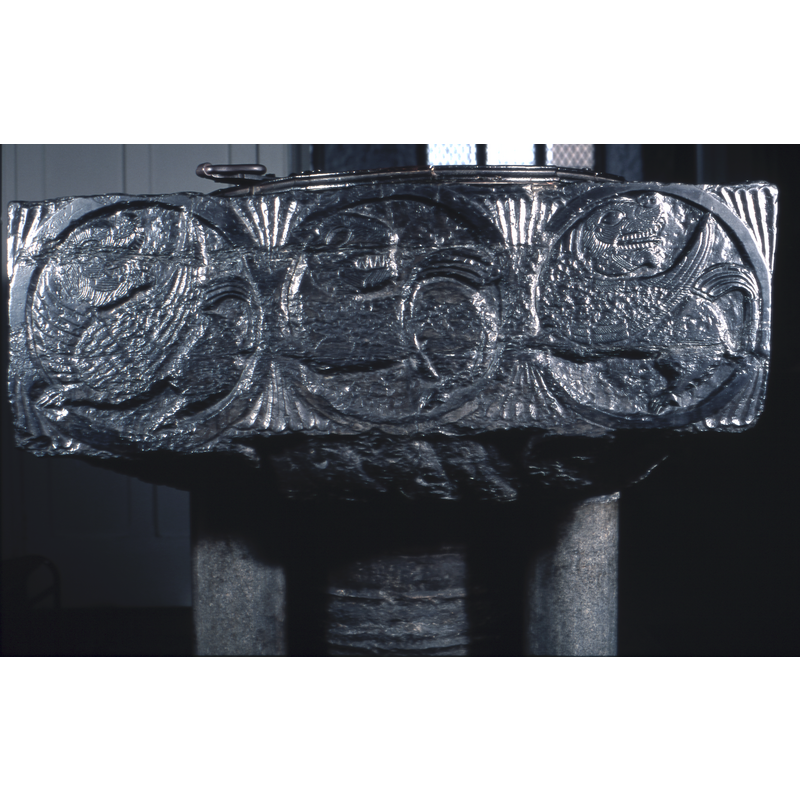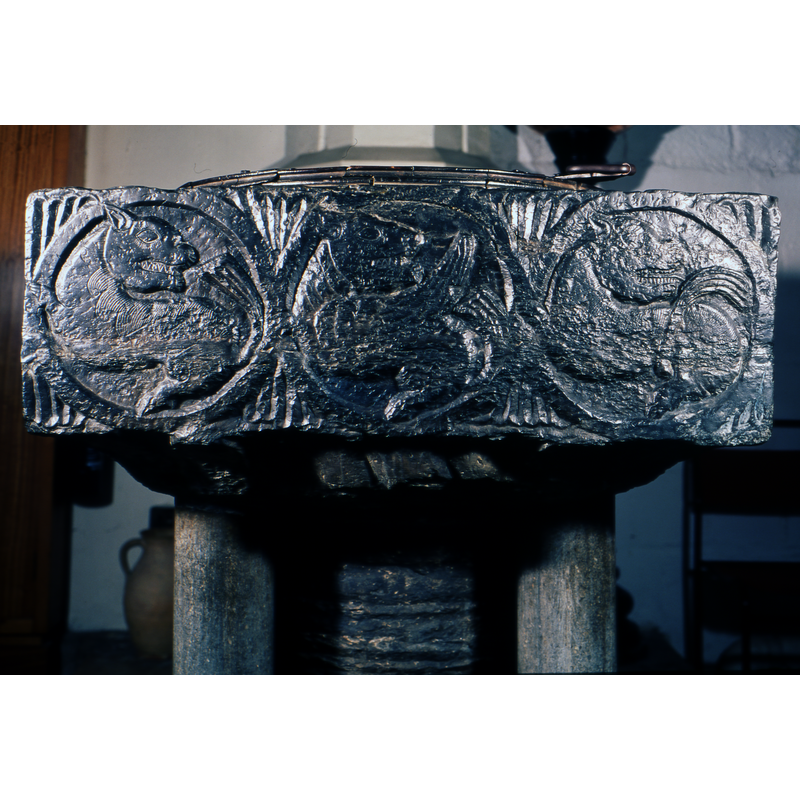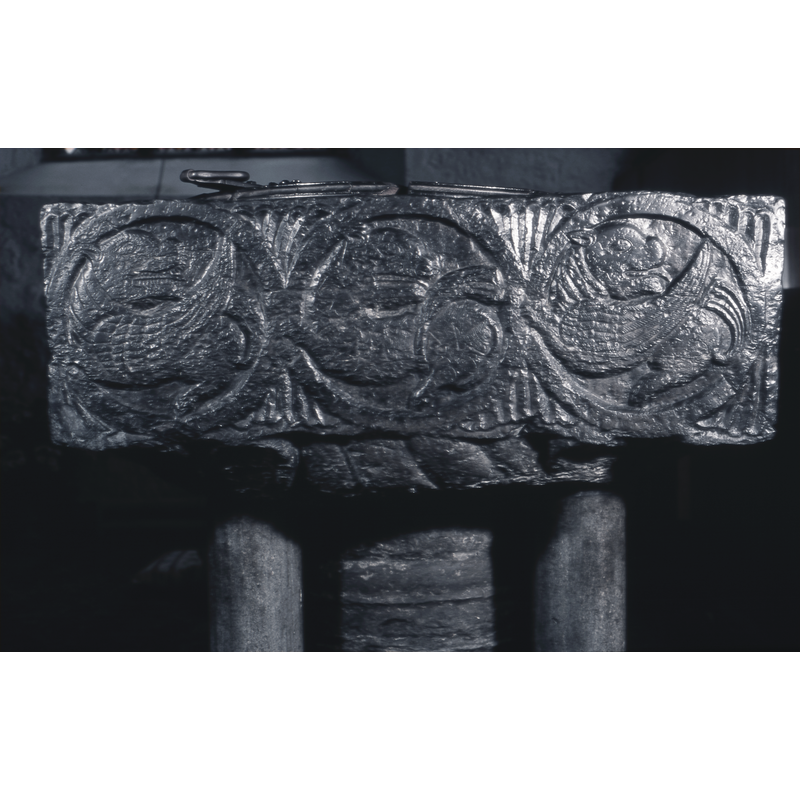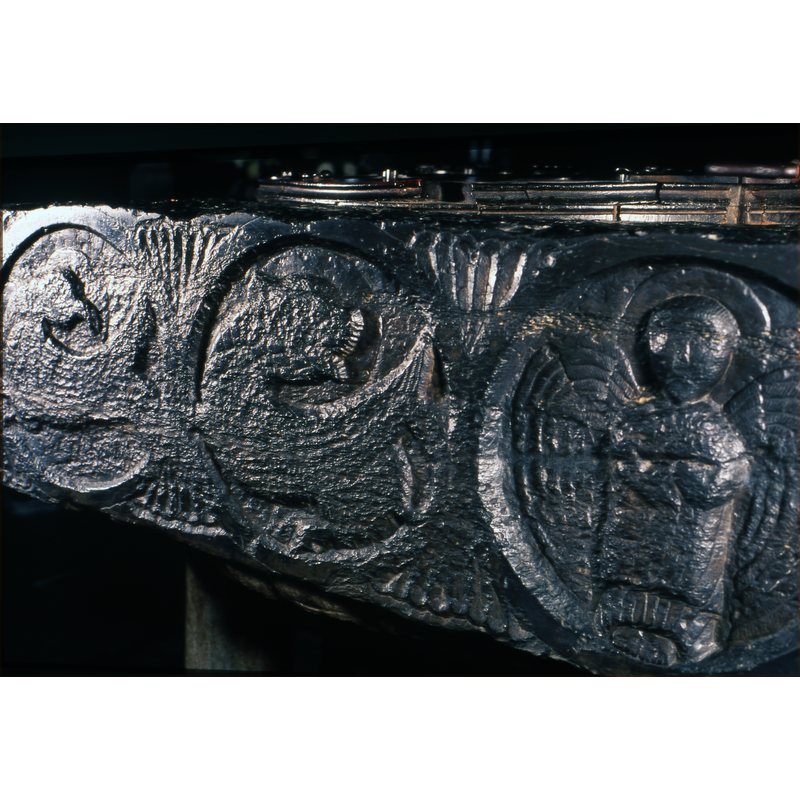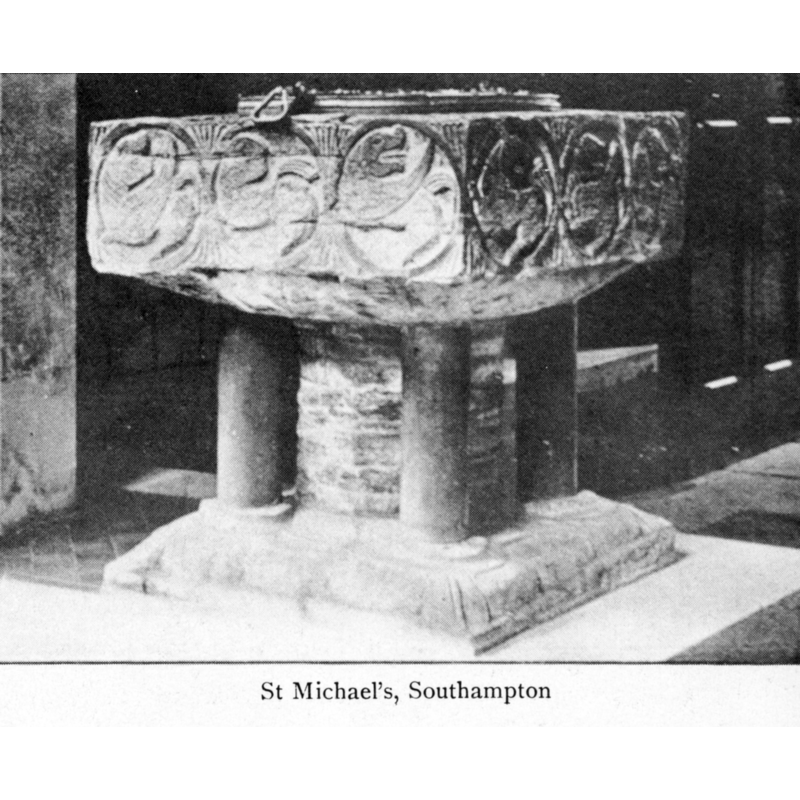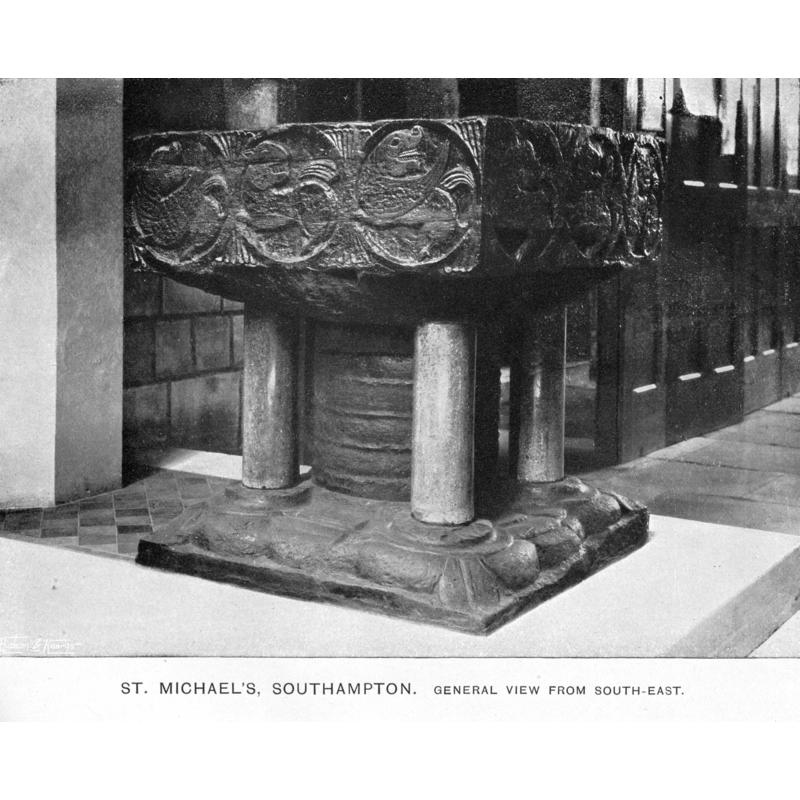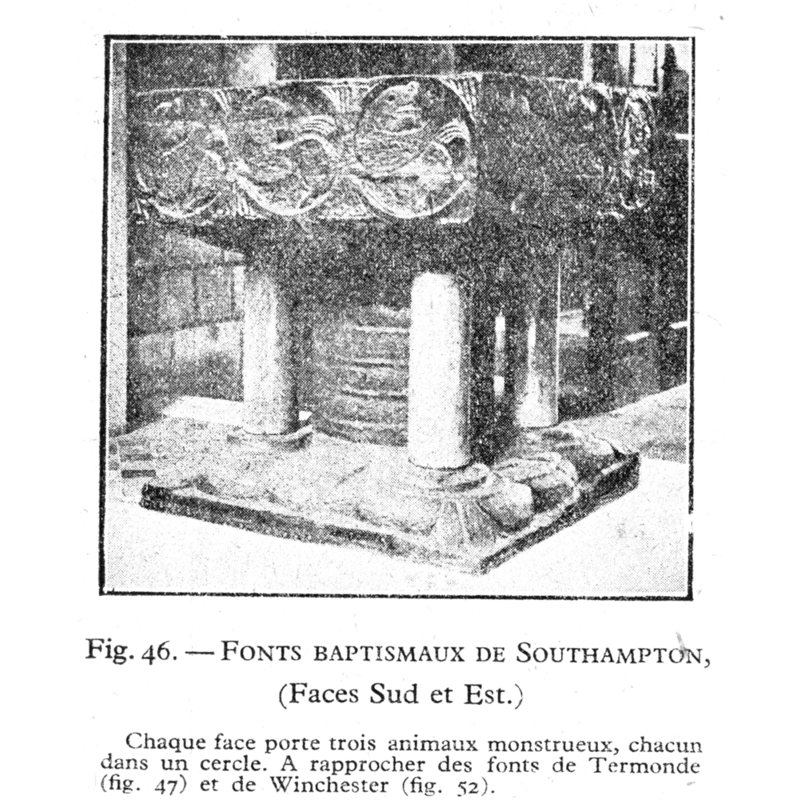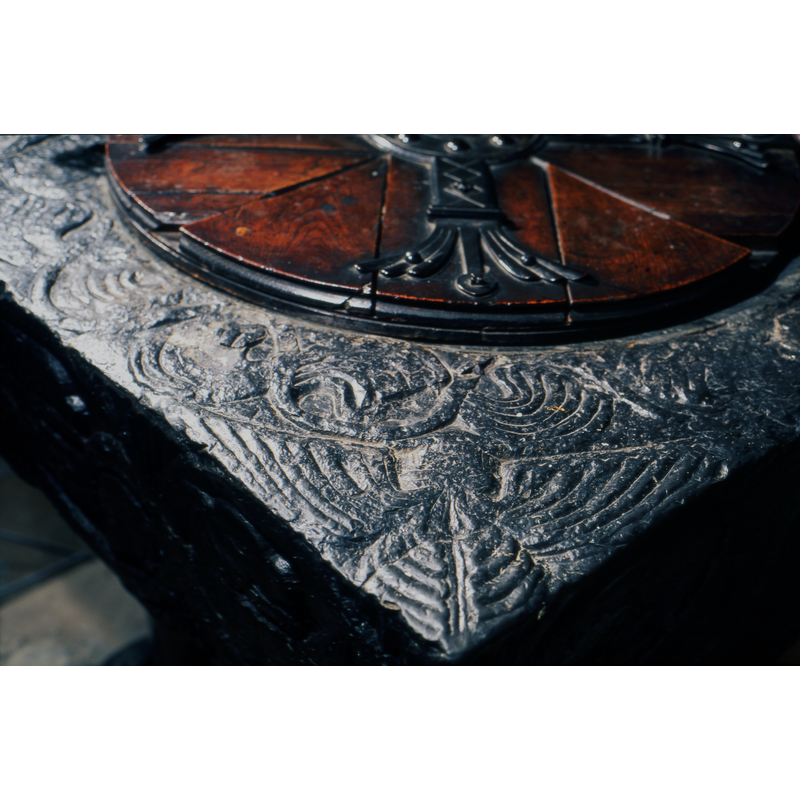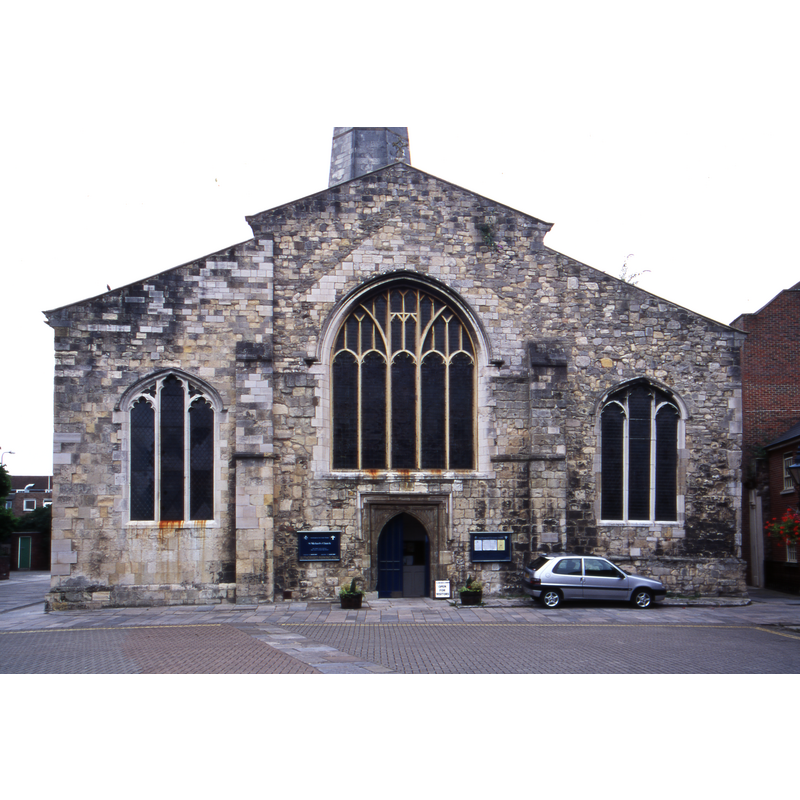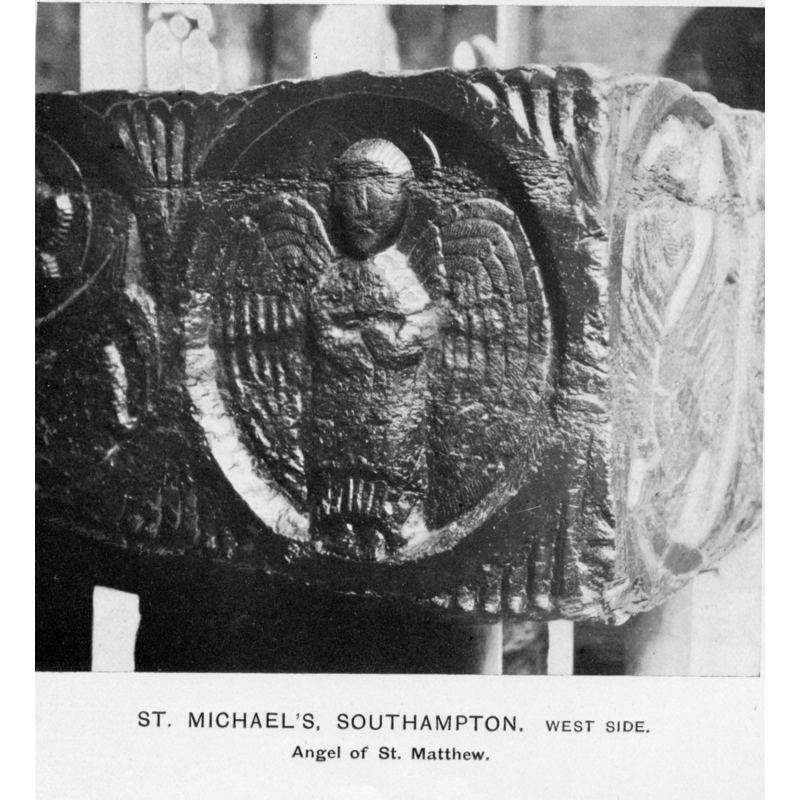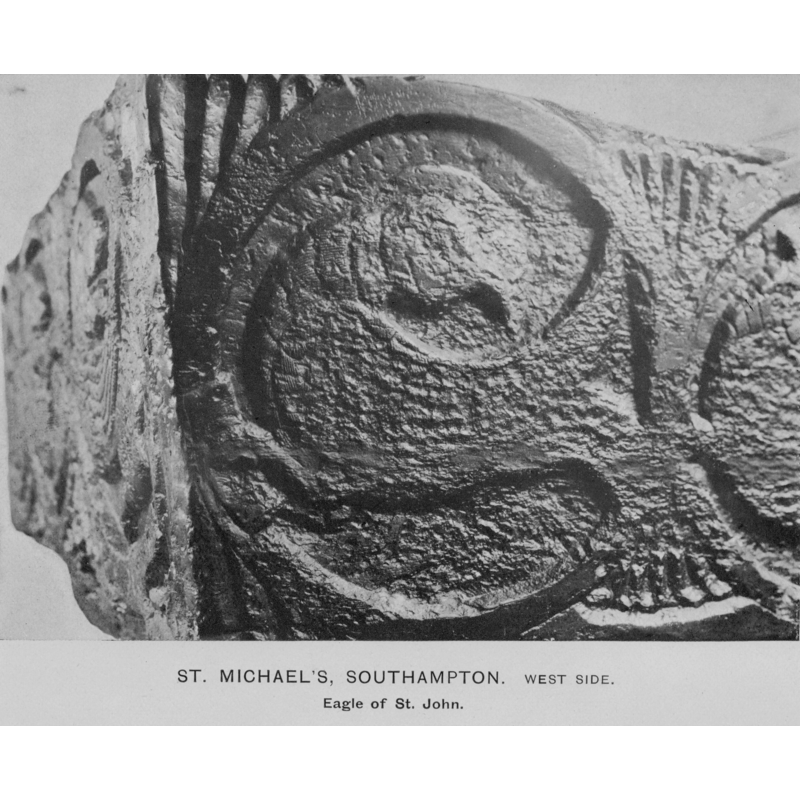Southampton No. 1 / Hamwic / Hantune
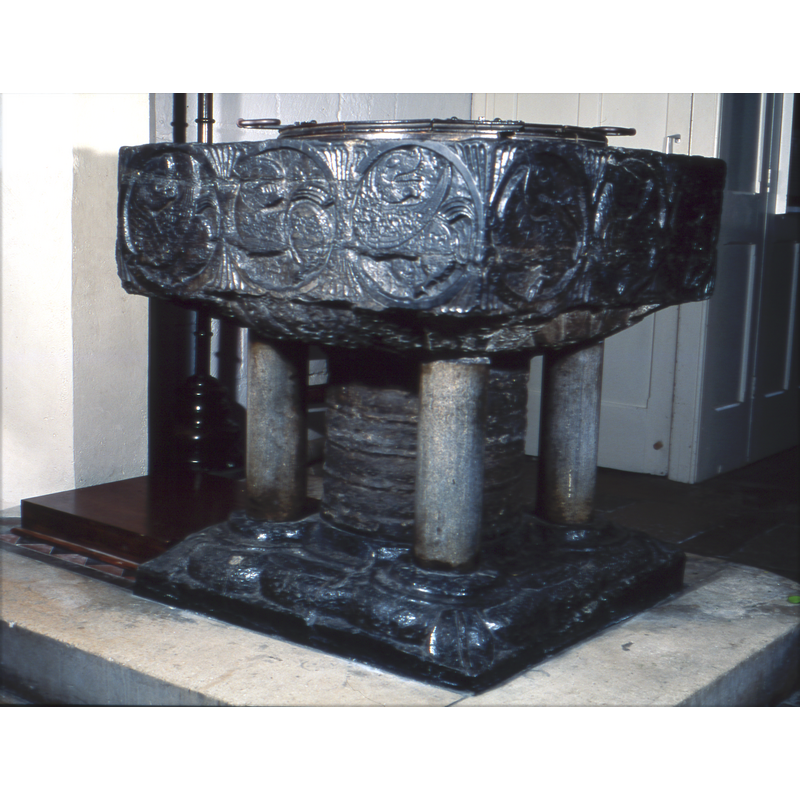
Image copyright © Baptisteria Sacra Index, 2023
Photograph and reproduction fee paid at St. Michael's (July 2000)
Results: 20 records
B01: animal - fabulous animal or monster - griffin
B02: animal - mammal - lion
B03: animal - fabulous animal or monster - griffin
B04: animal - mammal - lion
B05: animal - fabulous animal or monster - griffin
B06: animal - mammal - lion
B07: animal - fabulous animal or monster - griffin
B08: animal - mammal - lion
B09: animal - fabulous animal or monster - griffin
B10: Apostle or saint - Evangelists - St. John - symbol - eagle
B11: Apostle or saint - Evangelists - St. Mark - symbol - winged lion
B12: Apostle or saint - Evangelists - St. Matthew - symbol - angel
view of font
view of font
view of font - southeast side
view of font
design element - motifs - organic
Scene Description: All around the upper surface of the basin top; note the wing-like motifs of the spandrels
Copyright Statement: Image copyright © Baptisteria Sacra Index, 2023
Image Source: digital image of a photograph taken 25 July 2000 by BSI
Copyright Instructions: Photograph and reproduction fee paid at St. Michael's (July 2000)
view of church exterior
view of font - west side - detail
INFORMATION
Font ID: 00324SOU
Object Type: Baptismal Font1
Date Visited: 2000-07-25
Font Century and Period/Style: 12th century (late?), Romanesque
Workshop/Group/Artisan: Tournai font
Cognate Fonts: Termonde, Winchester, Zedelghem
Church / Chapel Name: Parish Church of St. Michael
Font Location in Church: Inside the re-built church, at the W end, S side
Church Patron Saint(s): St. Michael
Church Notes: Original church was under the patronage of Henry of Blois, Bishop of Winchester from 1129-1171. The present church (July 2000) was built after WWII; the previous church was totally destroyed by Luftwaffe bombs but the beautiful font basin survived.
Church Address: St. Michael's Square, off Bugle St, Southampton SO14 2AD, UK
Site Location: Hampshire, South East, England, United Kingdom
Directions to Site: Located off the M271. The church is located on the E side of St. Michael's Square off Bugle Street
Ecclesiastic Region: Diocese of Winchester
Historical Region: Hundred of Mansbridge
Additional Comments: recycled font (the basin of the present font survived the destruction of the church in WWII and is now in the new church, on "new legs") -- disappeared font? (the one from the Domesday-time church here)
Font Notes:
Click to view
There are four entries for Southampton [variant spelling] in the Domesday survey [http://opendomesday.org/place/SU4111/southampton/] [accessed 30 July 2019], one of which reports "3 churches. 1.0 church lands" in it. Noted and illustrated in Britton's Dictionary of 1838. The Mirror of Literature, Amusement and Instruction (no. 969, vol. xxxiv, 21 September 1839: 186) notes "a most curious and highly ancient font" much resembling the one at Winchester Cathedral; the note includes a full description of the font, including some measurements. The Mirror... concludes: "The workmanship of the whole is in the rudest style of Saxon sculpture." Lewis' Dictionary of 1848 reports: "The font is highly enriched". White (1878) notes an "antique font is of Saxon workmanship, rudely carved in black marble" in this church. In Stevens (1880). The Antiquary (issue No. 22, vol. 6, September 1882: 126) notes the similarity of this font with that at East Meon [the text actually reads "West Meon"]. Described and illustrated in Bond (1908) as a baptismal font from the Tournai workshops, dated to the third or fourth quarter of the 12th century, and ornamented with animal motifs as well as the Evangelists' symbols. The Victoria County History has a full description (Hampshire, vol. 2, 1904). The next volume of the VCH (Hampshire, vol. 3, 1908) notes that "the font removed from the tower to the west end" in the restoration of 1872. Eden (1909) mentions that the four colonnettes of the base are not original and that, although it is not known when they were replaced, the originals ones were present in a 1809 etching. Eden (ibid.) identifies the material of the replacement shafts as 'Purbeck marble" [i.e. Purbeck limestone]. Described and illustrated in Ronse (1929) who also notes the new colonnettes of the base. On-site notes: the magnificent square mounted font in black-blue Tournai marble at the church of St. Michael is decorated in one of the traditional ways: the sides of the basin have animals in roundels, three to each side. 1)griffin-lion-griffin; 2)lion-griffin-lion; 3)griffin-lion-griffin and 4)haloed eagle-winged lion-haloed angel, the symbols of three of the Evangelists. Described and illustrated in Ronse (1929), who notes the new colonnettes of the base.
COORDINATES
UTM: 30U 612148 5639870
Latitude & Longitude (Decimal): 50.89959, -1.40515
Latitude & Longitude (DMS): 50° 53′ 58.52″ N, 1° 24′ 18.54″ W
MEDIUM AND MEASUREMENTS
Material: stone, limestone (black and blue) (Tournai marble) [the rerplacement shafts are made of Purbeck limestone]
Font Shape: square, mounted
Basin Interior Shape: round
Basin Exterior Shape: square
Drainage System: centre hole in basin
Drainage Notes: lead lining
Rim Thickness: 14 cm* (36 at the corner angles)
Diameter (inside rim): 72-73 cm* [75 cm in The Mirror...]
Diameter (includes rim): 100 cm*
Basin Depth: 35 cm*
Height of Basin Side: 33-35 cm* [33.75 cm in The Mirror...]
Basin Total Height: 49 cm* [45 cm in The Mirror...]
Height of Base: 60 cm
Height of Central Column: 44-46 cm*
Height of Side Columns: 45 cm [in The Mirror... -- diameter, 15 cm]
Font Height (less Plinth): 109 cm*
Font Height (with Plinth): 127 cm*
Square Base Dimensions: 96 x 94 cm*
Trapezoidal Basin: 101.5 x 101.5 cm* [100 cm in The Mirror...]
Notes on Measurements: * BSI on-site -- [Eden (1909: 18) has: total font height w/o step: 3' 6"; step: 7"; height of bowl: 1' 7"; depth of bowl: 1' 2"; bowl diameter outside: 3' 3 1/2"; bowl diameter inside: 2' 5" [lead lined]]
LID INFORMATION
Date: modern
Material: wood
Notes: The round wooden lid with metal cross reinforcement fits the basin well
REFERENCES
- Victoria County History [online], University of London, 1993-. URL: https://www.british-history.ac.uk.
- Victoria County History [online], University of London, 1993-. URL: https://www.british-history.ac.uk.
- Bond, Francis, Fonts and Font Covers, London: Waterstone, 1985 c1908, p. 46, 153, 155, 167, 183, 205 and ill. on p. 170
- Britton, John, A Dictionary of the Architecture and Archaeology of the Middle Ages, including […], London: Longman, Orne, Brown, Green, and Longmann, Paternoster Row, and the Author, Burton Street, 1838, p. 127 / [http://books.google.ca/books?id=vO5PbV1ppbAC&pg=RA2-PA127&lpg=RA2-PA127&dq=bremhill+church+font&source=web&ots=4GsoexXupn&sig=DNMvDt3R1TjCjsiC-vFNvpnw5e0&hl=en&sa=X&oi=book_result&resnum=2&ct=result#PPA4-IA1,M1] [accessed 15 August 2008]
- Cox, John Charles, English Church Furniture, New York: E.P. Dutton & Co., 1907, p. 200
- Davies, J.G., The Architectural Setting of Baptism, London: Barrie and Rockliff, 1962, p. ix, 65 and ol. 15
- Drake, Colin Stuart, "Romanesque Fonts in Kent: the French Connections", CXXIII, 2003, Archaeologia Cantiana, 2003, pp. 333-352; p. 334, 344 and pl. VII
- Dru Drury, G., "The use of Purbeck in mediaeval times", 70, Proceedings of the Dorset Natural History and Archaeological Society, 1949, pp. 74-98; p. 78
- Eden, Cecil H., Black Tournai Fonts in England, London: E. Stock, 1909, p. 9, 11, 17-18 and plates
- Friar, Stephen, The Sutton Companion to Churches, Thrupp, Stroud (Gloucs.): Sutton Publishing, 2003, p. 203
- Hannah, D. D. [Vicar of Brighton], "On the Church of St. Nicholas and its ancient font, with illustrations from other fonts of similar antiquity", XLII, Journal of the British Archaeological Association, 1886, pp. 26-34; p. 32
- Holmes, Edric, Wanderings in Wessex: an Exploration of the Southern Realm from Itchen to Otter, London: Robert Scott Roxburghe House, [1922]
- Lewis, Samuel, A Topographical Dictionary of England, Comprising the Several Counties, Cities, Boroughs, Corporate and Market Towns, Parishes, Chapelries, and Townships, and the Islands of Guernsy, Jersey, and Man, with Historical and Statistical Descriptions [...], London: S. Lewis, 1831, [www.british-history.ac.uk/report.asp?compid=51288] [accessed 2 March 2007]
- Ronse, F. T., Les fonts baptismaux de Zedelghem et les fonts romans tournaisiens du XIIe siècle, Bruges: Apostolat liturgique, 1929, p. 11 and fig. 46
- Stevens, J., "The Font at St. Mary Bourne, Hants", 36, Journal of the British Archaeological Association, 1880, pp. 30-33; p. 30ff
- Tyrrell-Green, E., Baptismal Fonts Classified and Illustrated, London: Society for Promoting Christian Knowledge: The Macmillan Co., 1928, p. 66, 133
- White, William, History, gazetteer and directory of the County of Hampshire including the Isle of Wight, and [...], Sheffield: William White, 1878, p. 529
